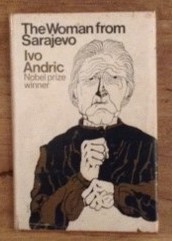Inspiring Older Readers
 posted on 20 Jan 2017
posted on 20 Jan 2017
The Woman From Sarajevo by Ivo Andric
Ivo who? That’s certainly what I thought when I came across this book in a charity shop not too long ago. I’m constantly dumbfounded by the depths of my own ignorance and the fact that I’d never even heard of this Nobel Prize winning novelist just seemed to confirm how deep that pit is.
Andric was a native Croatian born in 1892 but spent a good deal of his adult writing life as a part of post-Second World War Yugoslavia – he died in 1975 before the death of Tito and the break-up of the Balkan bloc. He was awarded the Nobel Prize for literature in 1961 for what the Nobel Committee called "the epic force with which he ... traced themes and depicted human destinies drawn from his country's history" and in doing so edged out both Tolkien and Robert Frost who were also up for the award.
The Woman From Sarajevo is what I suppose we’d now call ‘faction’ – Andric’s attention was caught by a rather throw-away news story about the death in 1935 of an elderly woman, Raika Radakovich, in Belgrade. When it was established that she had died from natural causes rather than being the victim of a lurid crime, the papers lost interest and her story slipped into oblivion. Or almost – because Andric has picked the story up and spun a morality tale out of the rather tragic circumstances.
Interestingly, Andric doesn’t moralise at all – he lets the sadness of the story speak for itself. Radakovich lived her early life in Sarajevo and in a strangely twisted way dedicated herself to becoming a millionaire – believing this is what her dead father would have wished her to do. In pursuit of this goal she systematically alienates all her contemporaries who have no role to play in her business ambitions and through a mix of miserliness and moneylending she sets off on her path to riches. Needless to say, her single-minded dedication to money brings her no satisfaction and sours all her remaining relationships – including the one with her mother.
However, disaster is not far away and comes upon Radakovich in the form of war. The assassination of Archduke Ferdinand and the outbreak of the First World War exposes the native, minority Serbian population to scrutiny and by the time the war is over public sentiment forces Raika and her mother to flee to join family in Belgrade where she must once again build new networks and exploit a new clientele in pursuit of her mythical million.
Up to this point her single-mindedness has precluded any close emotional engagement with anyone but unaccountably Radakovich finds herself fascinated and in thrall to a handsome confidence trickster who rooks her for a substantial sum of money. Disgusted with herself she withdraws her favours and redoubles her efforts to build back her fortune – but times are hard and the only way she can save money is by increasingly austere spending reductions on her own food, heating and light. She literally shrivels before our eyes.
At the same time she is gripped by paranoia and suspects unidentified suspects are seeking to rob here. She turns her house into a fortress but still finds no peace. And then one evening, stumbling in the dark she mistakes a coat rack for an intruder and her heart gives out.
The moral of the fable is pretty clear and Andric doesn’t need to labour the point – although perhaps a lesser writer wouldn’t have handled the material with the same confidence. I suspect that praise is also due to Joseph Hitrec who translated the book from Serbo-Croat and has made it fluent, readable and, in a good way, ghastly.
The book is available in a medium priced paperback with a new translation but hardback copies seem to be prohibitively expensive. I’ve never seen another copy on sale in a second hand shop so if you want a copy, the internet is probably the way to go.
Terry Potter
January 2017